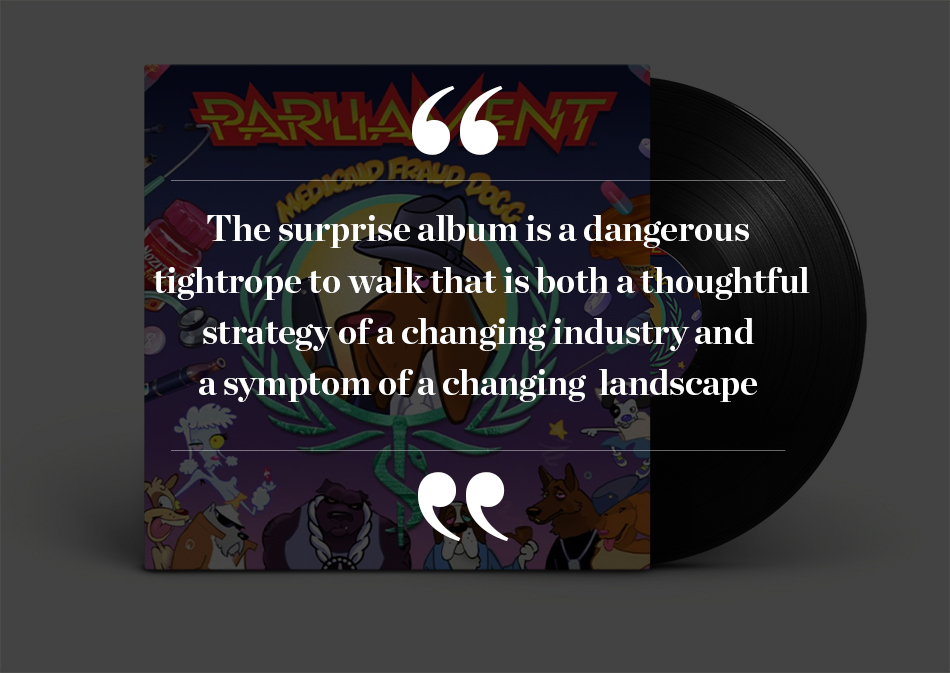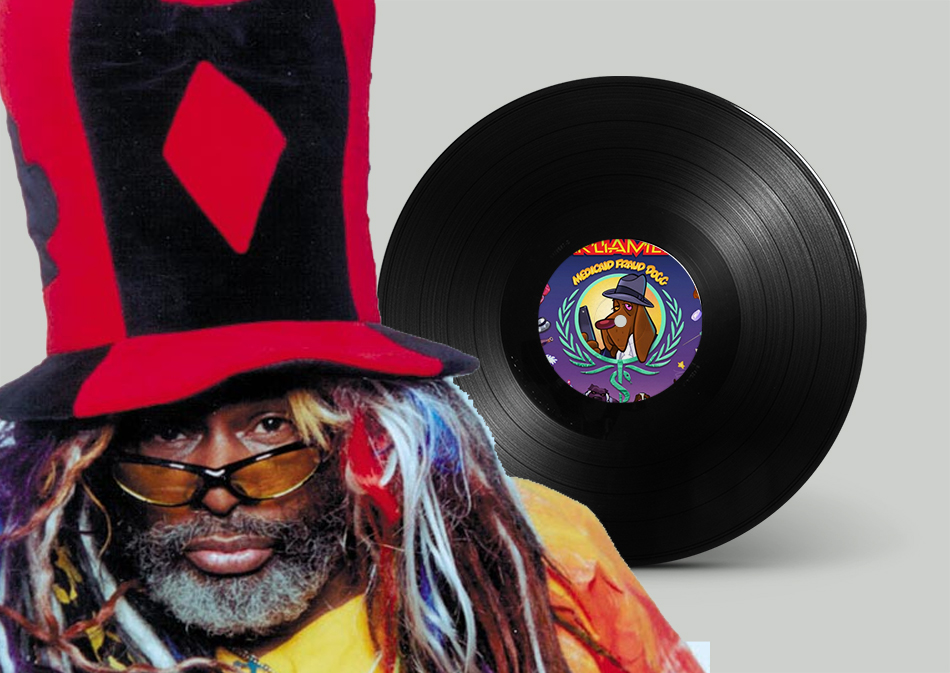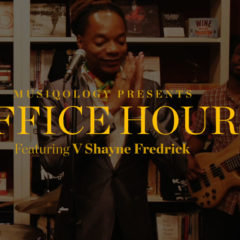In an age of virality, the surprise album release has become an interesting industrial tactic for artists looking to avoid the critical oversight of middle management and seize the public spotlight. With the release of George Clinton and Parliament’s Medicaid Fraud Dog, the group’s first release in 38 long years, it adds a new chapter to a surprising development in an age of tailored image-making and armies of consultants adding to corporate infrastructures: the surprise album.
Since the indie-rock band Radiohead set sail a thousand thinkpieces with the 2009 pay-as-you-please release of In Rainbows, musical acts have explored out-of-nowhere releases, eschewing the time-honored slow build of the “album cycle” in favor of of-the-moment appeal to our of-the-moment culture. Drake played with the idea on 2015’s surprise If You’re Reading This It’s Too Late, where the title itself is a play on the instant-speed nature of our all-consuming popular culture maw. After 14 years of waiting, D’Angelo’s Black Messiah emerged quickly in December 2014, at least in part in response to protests after a grand jury’s decision not to prosecute the policeman who murdered Statin Island’s Eric Garner. Beyoncé released a surprise visual album on April 23, 2016. We all know how that last one went.
Previously, musical releases followed a time-honored formula: set a release date relatively far in the future (so that magazines will cover it in their “albums due out later this year” roundups); release a single; begin expensive mass-media promotion including commercials on radio; court more media coverage with the “hook” being the album’s upcoming release; and eventually hit that date, watch your album climb the charts, and launch a tour in support of it. Each of these steps has been disrupted by the digitization of music, though not altogether rendered irrelevant. If you stream on Spotify, you still hear radio-style commercials for other acts. If you drop a single, it often still gets a thoughtful write-up in the content-hungry content-producing ecosystem in which a journalist is given one listen to comprehend and digest an album before regurgitating some thoughtful takeaways.
The New Yorker’s Amanda Petrusich, responding to Kendrick Lamar’s surprise untitled unmastered. in 2016, lamented the state of things in an article titled “The Music Critic in the Age of the Insta-Release.” No one wants to be a doddering relic, squawking about the glory of olden times, when we churned fresh butter and listened to new records for a couple of weeks before bestowing numerical scores upon them,” she wrote. “But, for me, the idea that the culture is now not merely accepting but, in fact, demanding instantaneous critical evaluations of major works of art feels plainly insane.” Maybe it’s the holiday weekend coming, but imagine if Limeade, Beyoncé’s follow-up, dropped while you were in line at the supermarket with your vegetable sampler and your potato rolls? Do you, the writer—a member of an already underpaid and precarious labor force—drop the Heinz 57 and hustle to the nearest wooden bench with Wi-Fi? Or do you let someone else beat you to the punch?
The surprise release requires critics to be ready with thoughtful, neat analysis, replete with witty puns plus a thorough understanding of how the album’s parts fit together, to say nothing of ancient practices such as fact-checking. It thus might be understood as a product of our on-demand age, where, outside of The New Yorker, media critics are expected to be good and fast at the same time, waiting at their keyboard with a publication-ready take at the tips of their fingers. There are times as a creative person where that happens—I don’t mean to brag, but some of the mass media pieces I’ve written in the last few years have come together shockingly quickly—but it is to the detriment of our cultural understanding of our texts if by the time thoughtful criticism emerges, the culture industry has moved on to the next hot thing.
What does this mean for scholars, notorious for their slow-unfurling takes and motivations that revolve around deeper meaning and teaching? Ironically, I sat down to write a follow-up to Petrusich’s piece in 2016 called “The Academic in the Age of the Insta-Release,” but other professional demands pulled me away and it never came to fruition. That has happened dozens of times in a profession where you are always a student-email or service commitment away from being “at work” on your phone or personal time. For academics—who aspire to levels of cultural analysis that are more than trendspotting—the surprise release lives differently in the culture. It has to. We just haven’t yet had the time to figure out exactly what’s different yet.
What does this mean for the industry itself? Again, the point about the dangers of on-demand culture has been made enough elsewhere. In an age where everything from public transportation to the bodega seem ripe to be plucked by the disruption automaton housed in central California and spreading like an ooze to desperate cities seeking to sell out their populations to attract wealthy coders, disrupting the music industry model—which has always held its share of grifters from the days of payola and predatory record deals to the corporately consolidated behemoths that run things these days.
Further, though, the surprise release sets a bad example because only a select group of artists really have the import to move the cultural needle any more than a blip. The PR model is what prevents smaller acts from yelling, “Surprise!” to an empty room. As labels divest themselves of these bloated PR infrastructures, smaller acts find the old model harder to access and the new one ill-suited to giving them a chance in the insanely competitive market for our ears and attention.
And what does this mean for George Clinton?
You thought the wait for D’Angelo was long? Card-carrying Funkateers have been waiting 38 years for a new album under the Parliament moniker. By that same notion, we’ve made you wait a thousand words before getting to Dr. Funkenstein.
In all honesty, I’m not worried about George Clinton. He’s 76 years old and if he wants to release an album on a Tuesday with little warning, he can do so. But the idea that such a momentous occasion for a legacy act with such a devoted fanbase would mark this release with such little fanfare is, we might conclude, at least somewhat symptomatic of an industrial condition. Here’s a shocking, only-in-2018 statement that, even ten years ago, would have sounded like the nonsense vocabulary of “psychoalphadiscobetabioaquadoloop” and “trombipulation”: The album does not even have its own Wikipedia entry yet. Does it even exist?
The album is a rich and thoughtful meditation on American culture, largely thematizing “medicated creep” in a way not dissimilar from the 1977 Clinton creation “the Placebo Syndrome.” Clinton mixes street drug metaphors with a wider critique of addiction and the prescription pill apparatus eating America, “One Nation under Sedation.” “Antisocial Media” suggests Clinton’s “Twitter finger is itching like I’m on dope.” The vocal on “Pain Management” seems intentionally strained, as if the singer is on something—with or without a script for it. “Medicaid’s side effect might be worse than the thing you’re trying to fix,” the singers intone on the album’s title track.
This is not hyperbole: Medicaid Fraud Dog is relevant, thoughtful music from one of America’s greatest living artists. And yet, in a time when we have a technical apparatus more capable than ever of delivering information, Clinton’s work is just more content in the digital void.
I can’t help but wonder why Clinton—an established artist who has a lot of pull with radio stations in his thankfully less drug-influenced twilight years would release this album, which clearly took some serious studio time, in such a guerilla fashion. Clinton has always been a forward thinker whose sonic explorations created the Afrofuturism playbook and influenced countless generations that came after. Two days later, no thoroughgoing review of the 23-track, 107-minute behemoth record has emerged. Instead, the news is its existence in the first place.
In some respects, this blog post exists in part because we’re fans of Clinton and what to play our role in the publicity machine. If we hip one person to the knowledge that there’s a new Parliament record and allowed others to reconnect with the Mothership, we’ve done our civic duty in this one nation under a groove. But a deeper and more meaningful analysis needs more time than the release allows us to give it.
Thus, the surprise album is a dangerous tightrope to walk that is both a thoughtful strategy of a changing industry and a symptom of those changes. Perhaps Medicaid Fraud Dog will receive the unexpected but not unheard-of second bump of publicity after its release. It’s not like it’s going away. But industrial conditions and the silent release mean it misses its chance to impact the culture in a meaningful way. It’s more likely that if you’re reading this, it’s already too late.




 Share On Facebook
Share On Facebook Tweet It
Tweet It








